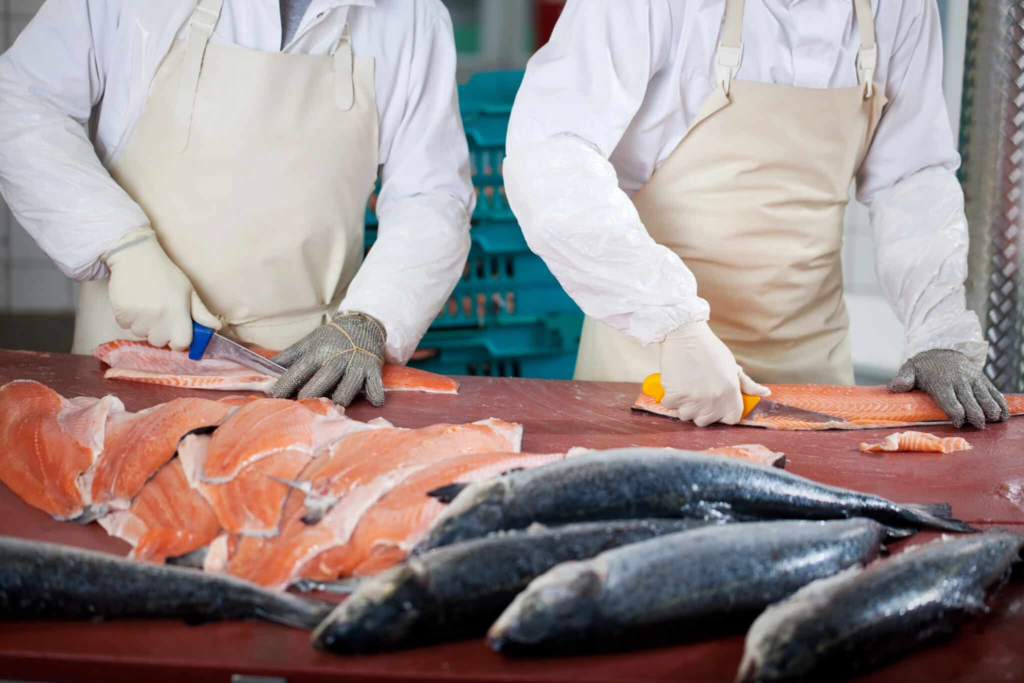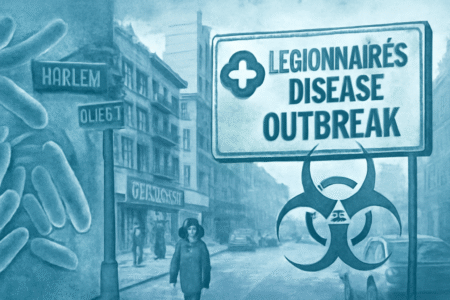A Maryland seafood distributor faced a widespread case of food poisoning caused by a homemade meal prepared by one of its employees. Over 100 people fell ill after consuming the meal, which was shared among colleagues and was not part of the company’s seafood production. The outbreak occurred in Jessup, Maryland, and resulted in several workers needing hospital treatment.

Local health authorities have launched an inquiry to identify the exact cause of the contamination and to ensure that appropriate safety measures are put in place to prevent similar incidents in the future.
In This Article
The Incident
The outbreak occurred at the Jessup-based seafood distributor, with over 100 employees falling ill within hours after consuming the meal. The homemade food, believed to have been prepared offsite and brought into the facility, quickly led to symptoms like nausea, vomiting, and severe stomach discomfort. While none of the affected workers were in critical condition, several were taken to nearby hospitals for treatment, and the situation has sparked concerns about food safety practices at workplaces.
Health Officials’ Response
Local health officials from Howard County and the Maryland Department of Health have launched an investigation into the foodborne illness outbreak. Officials have collected samples of the food for laboratory testing, aiming to identify the specific pathogen responsible for the mass illness. The investigation will look into whether improper food handling, contamination, or spoiled ingredients led to the outbreak.
Dr. Kelly, the head of the health department, stated, “We are working closely with the seafood distributor to determine the exact cause of this outbreak and ensure that such an incident does not happen again.”
Contaminated Homemade Food, Not Seafood
The seafood distributor was quick to clarify that the contaminated food was a homemade meal shared among employees and was not connected to the company’s seafood products. This distinction is important, as the company distributes seafood to multiple vendors across Maryland, and any contamination of its products could have had broader implications.
The company emphasized that its seafood production remained unaffected by the outbreak, and all necessary food safety protocols in its operations were adhered to. The contaminated meal was not part of the company’s daily operations, reassuring vendors and consumers alike that there was no risk to the seafood supply chain.
Potential Cause of Contamination
While the investigation is ongoing, experts speculate that the contamination could have been caused by improper food handling practices or bacteria present in the ingredients used to prepare the meal. Foodborne illnesses are often caused by pathogens such as Salmonella, E. coli, and Listeria, which can thrive in poorly stored or cooked foods. Additionally, cross-contamination, where harmful bacteria from one food item spread to another, is a common issue in foodborne illness outbreaks.

One possibility under consideration is that the homemade meal was improperly stored before being served to employees, allowing bacteria to multiply to dangerous levels. Another potential factor could be the use of ingredients that were not fresh or improperly cooked.
Safety Protocols for Homemade Meals in the Workplace
This incident has raised important questions about the safety of homemade meals in the workplace. Many companies allow employees to bring in food from home or share meals, but this practice can increase the risk of foodborne illness if proper precautions are not taken. Homemade meals may not always be prepared with the same level of care and oversight as commercially produced foods, which are subject to strict food safety regulations.
To mitigate such risks, health officials recommend the following guidelines:
- Proper Storage: Homemade meals should be stored at appropriate temperatures to prevent the growth of harmful bacteria. Cold foods should be kept below 40°F, while hot foods should be kept above 140°F.
- Hygiene: Employees preparing or serving homemade meals should follow basic hygiene practices, such as washing hands and utensils, to prevent contamination.
- Ingredient Safety: It’s important to use fresh ingredients and cook them to safe internal temperatures to kill harmful pathogens.
- Avoid Cross-Contamination: Raw foods should be kept separate from cooked foods to avoid the spread of bacteria.
Also Read:Harvey Weinstein Diagnosed with Bone Marrow Cancer, Undergoing TreatmentLessons for Employers
Employers can learn valuable lessons from this incident. Food safety in the workplace is paramount, even when it comes to employee meals that are not part of the company’s production line. Employers should consider establishing guidelines for homemade meals or potluck events to ensure the safety of all employees.
Some safety measures that employers can adopt include:
- Providing refrigeration for employee meals to ensure proper storage.
- Educating employees on safe food handling practices.
- Limiting or supervising the distribution of shared meals in the workplace.
- Ensuring that communal eating areas are regularly cleaned and sanitized.
By taking proactive steps, employers can reduce the risk of foodborne illness outbreaks and protect their workforce.
Conclusion
The mass food poisoning outbreak at the Maryland seafood distributor serves as a stark reminder of the importance of food safety, even in informal settings like homemade meals shared among employees. While the company’s seafood production remains unaffected, the incident highlights the need for careful food handling and proper storage to prevent similar occurrences in the future. As health officials continue their investigation, this case underscores the importance of following food safety protocols in all aspects of food preparation, whether at home or in the workplace.
FAQs
1. What caused the food poisoning outbreak at the Maryland seafood distributor?
The outbreak was caused by a contaminated homemade meal shared among employees, not the seafood products distributed by the company.
2. How many people were affected by the foodborne illness?
Over 100 employees fell ill after consuming the contaminated meal, with several being hospitalized.
3. Is the company’s seafood safe for consumption?
Yes, the company clarified that the contaminated food was not related to its seafood production, and there is no risk to the seafood supply chain.
4. What are the common causes of foodborne illness?
Foodborne illnesses are typically caused by pathogens like Salmonella, E. coli, and Listeria, which can thrive in improperly stored or cooked foods.
5. What can employers do to prevent foodborne illness in the workplace?
Employers can establish guidelines for homemade meals, provide refrigeration, educate employees on food safety, and ensure proper hygiene in communal eating areas.
- How to Stay Healthy During Flu Essential Tips for Every Family
- Satyapal Malik Death on 5 Aug 2025: Political Legacy That Shaped Indian Public Life
- Growing Legionnaires’ Disease Outbreak in NYC’s Harlem Claims Two Lives, Sickens Over 58
- Non-Alcoholic Drink Beer: fresh Alternative with a Unique Appeal
- Meet the Harley-Davidson X440: The Ultimate Desi Roadster
- OnePlus Pad 3: The Android Tablet That Wants Your Laptop’s Job













